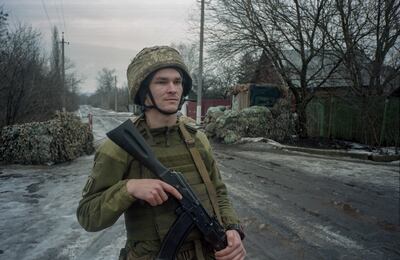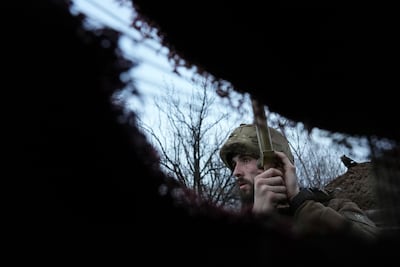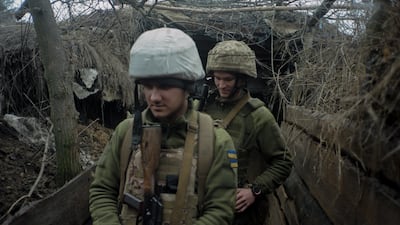Live updates: follow the latest news on Russia-Ukraine
As the prospect of a Russian invasion of Ukraine looms ever larger on the horizon, the Ukrainian soldiers manning the trenches of the Donbas war remain incredulous at the prospect of a conflagration.
“No one can tell what is going to happen tomorrow, all we know is that we'll be ready, no matter what”, says Andrii, 23, clutching the handle of his AK-74 assault rifle. Leaning on a wooden post in a muddy trench on the outskirts of Zolote, eastern Ukraine, the youthful soldier seems unconcerned by the recent Russian troop build-up at the border.
“Every day, we hear something different – they're going to invade, they're not going to invade, they're pulling back,” he sighs. “It's impossible to say what is going to happen.”
Residents of Zolote, a frontline village in the Lugansk region, were reportedly hiding in an earth-floored cellar on Monday, a shelter that was roughly improvised when the separatist conflict erupted in 2014 and has now brought back into service.
"These weeks they started shelling harder. Now they are shelling again," said 33-year-old handyman Oleksiy Kovalenko.
Over the past few weeks, Russia has amassed an estimated 150,000 troops along various stretches of its border with Ukraine, as well as in Belarus and Crimea, prompting fears that it might soon try to invade its western neighbour. In the capital city of Kiev, a number of embassies have been evacuated of personnel, while frantic diplomatic efforts are continuing to defuse the crisis.

But the men of the 24th Mechanised Brigade, a force nicknamed ‘King Danylo’ and manning the frontline positions of Zolote-4, remain composed in the face of this renewed threat. “There is going to be peace, one way or another," explains a fresh-faced private from a lookout position. "I think [Russian President] Putin is just trying to rattle us. I don't believe they're going to attack.”
The Ukrainian trench is located only a couple of hundred metres from the lines of the Russian-backed separatists of the self-proclaimed People's Republic of Luhansk, along the so-called line of contact that has divided eastern Ukraine for the past eight years.
In the event of a further Russian incursion into Ukrainian territory, the 24th mechanised brigade would therefore constitute the first line of defence. However, for its soldiers, keeping their feet dry and staving off boredom seem to be more acute concerns than separatists' bullets.

“You can read books, surf the internet or scroll on social media. Some people play video games in their free time. You have to keep yourself busy,” says Andrii. The native of Lviv has been serving for more than two years, driven as much by the desire to defend his country as by an affinity with the rigid discipline of military service. “I didn't manage to be posted exactly where I wanted, but overall I like it here,” he explains. “We get along well with the guys.”
Asked if he ever feels fear, Andrii lets out a chuckle. “I am used to it now,” says the soldier. “When I first arrived, I was scared when the shooting would start. Now, I don't feel fear, but rather adrenalin.”
For the past eight years, gunfire and mortar shells have been a daily occurrence in the frontline city Zolote, while sniper fire remains a constant threat. In April last year, a Ukrainian soldier was shot dead nearby. He was among 79 servicemen killed in Donbas in 2021 alone.

For unit press officer Nazar Ilnytskyi what had been a calm three weeks in the Zolote-4 section had taken on a darker, more incessant tempo.
"Enemy mortars and artillery are now firing day and night,” he reported in his latest update.
“In the morning and the afternoon, it's generally calm,” explains the burly man in his 30s. “Sometimes, they're trying to provoke us by firing at us with machine guns and automatic rifles. At night, the mortars start.”
As if to prove his point, short bursts of automatic gunfire ring out in the distance. The last one seems to be coming from the Ukrainian positions behind us. The distinct smell of gunpowder starts filling the trench. “See?”, asks Ilnytskyi with a wry smile. The two soldiers around him remain unfazed. As we exit the trench, the press officer gets rid of the mud caking his combat boots. “This is the real enemy here. The mud.”
In a nearby house repurposed into makeshift barracks, a couple of soldiers are preparing dinner. Ukrainian pop music is playing in the background. Hunched over a bucket of potatoes, a stern-looking recruit shrugs off our question on a potential invasion. “I don't know what's going to happen, I can't say. We'll defend ourselves if they attack.”
The dimly-lit house is humming with activity as the men go about their day. Some are reading, others playing on their phones. Most of them are young, no older than 25. Down in what used to be the basement, the rest of the soldiers are sleeping in shifts.
“We change positions on a regular basis and we all manage to get our eight hours of sleep, which is pretty good,” says Andrii. Children’s drawings adorn the walls, contrasting with the row of freshly-greased automatic rifles underneath: hearts coloured with the blue and gold of the Ukrainian flag, a hand grenade sprouting colourful flowers, children holding hands with smiling soldiers.
“They're sent to us by children from all over Ukraine, to thank us. They know we're here to protect them.”
It is a stirring thought as more gunfire can be heard echoing faintly through the village. The stern-looking recruit, now smoking a cigarette in front of the house, remains undisturbed by the clatter in the distance.
On February 18, the Special Monitoring Mission of the Organisation for Security and Co-operation in Europe recorded 222 breaches of the ceasefire in the Donetsk region, and 648 violations in Luhansk, where the men of the 24th Mechanised Brigade are posted. Two regions in eastern Ukraine where government and separatist forces have been fighting since 2014 were hit by more than 1,400 explosions on Friday, the monitors said. This figure rose to more than 2,000 on Saturday.




































